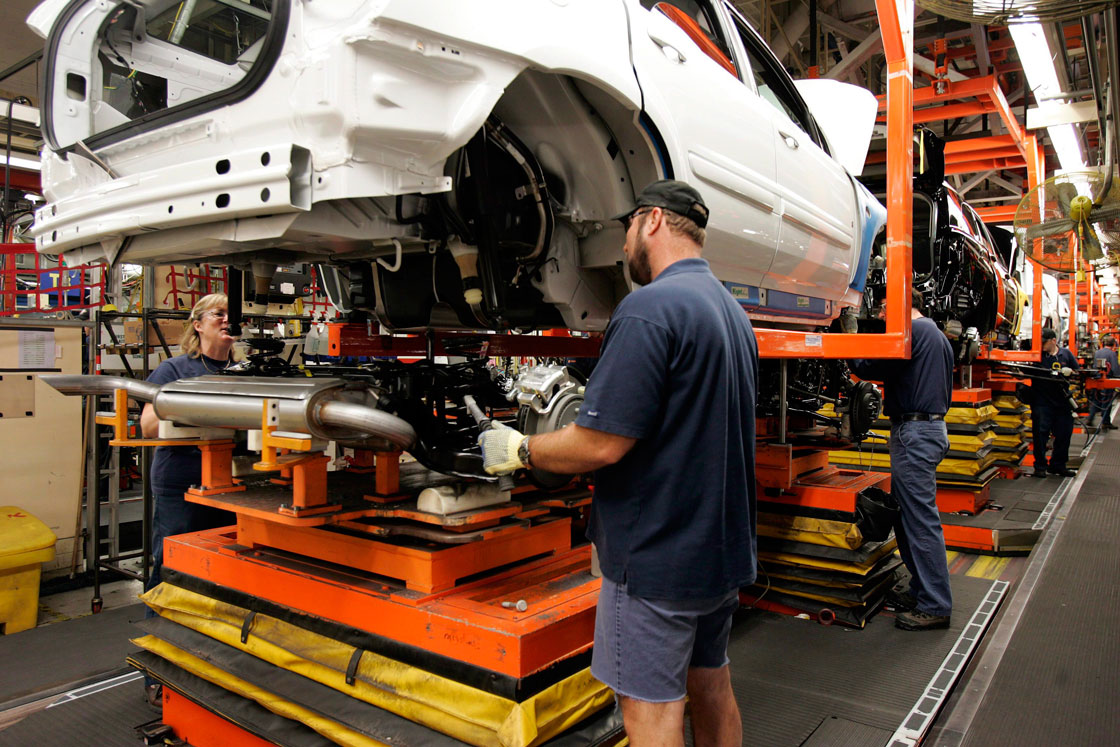The head of Canada’s largest private sector union calls them “the most important auto contract talks in a generation,” and experts say that’s probably not overstating things.

The negotiations between Unifor, which represents 40,000 auto-sector workers across Canada, and the so-called “Detroit Three” kicked off in Toronto last Wednesday.
All sides are coming to the table hoping for new deals by this fall, as the current contracts for workers employed by General Motors, Ford and Fiat Chrysler Canada all expire on Sept. 19.
New deals with each of three companies will be negotiated successively, with the first one forming a model for the others in what’s known as pattern bargaining.
Why are these talks so important?
“Negotiations are always important, but this time there are big issues on the table about product mandates, and that has implications for which plants will stay open in the long run,” said Wayne Lewchuk, a professor at McMaster University’s School of Labour Studies and Department of Economics.
Lewchuk explained that “product mandates” involve assigning the assembly of a new vehicle to a chosen plant. The situation is particularly precarious at the General Motors facility in Oshawa, Ont.
“There’s a real problem there, because they don’t have any car allocated in the immediate future. So once the ones that they’re producing are no longer produced, they don’t have anything else in line.”
WATCH: New technology a hot topic at Canadian International Auto Show

Without new cars and trucks rolling off the line starting in 2019, jobs will start to vanish.
There are approximately 23,000 Unifor members currently working for the Detroit Three. But beyond that, Unifor National President Jerry Dias told reporters on Wednesday, the big automotive companies are indirectly responsible for hundreds of thousands of additional Canadian jobs that feed into the assembly plants.
When you factor in these “spin-offs,” Dias said, the number of people affected balloons to half a million.
The employment stakes have always been high, but at a time when Canada’s manufacturing sector is still reeling from major job losses over the last decade (dropping from 2.1 million jobs in 2006 to 1.7 million jobs in 2014), Dias said the country can “ill afford” to lose more jobs to cheaper labour markets like Mexico.
There is also a broader economic picture to consider as the talks progress. Economists have noted Canada is shifting away from commodities like oil and gas toward other kinds of exports.
But the country’s trade deficit — the amount by which the cost of our imports exceeds the value of our exports — hit an all-time high in June, coming in at a record $3.6 billion.
READ MORE: How the TPP could affect Canada’s auto industry
According to Dias, getting firm commitments from the Detroit Three for investment plans means more exports for Canada, helping to close the trade gap.
Early conflict
As a sign of just how seriously it is taking things, the union has adopted a hard-line right from the start, saying unequivocally that “there will be no deals with any of the companies without commitments from each of them for investments in Canada.”
The companies have largely remained mum ahead of the negotiations. But General Motors recently indicated that while it’s “taking a hopeful perspective” on the talks, it doesn’t intend to make any commitments until they are finished.
“It’s not the best first move, on either part,” said Maurice Mazerolle, director of the Centre for Labour Management Relations at Ryerson University’s Ted Rogers School of Management.
“They’ll get past that, eventually.”
The pattern bargaining strategy is a good one in this case, Mazerolle said.
“Part of it is levelling the playing field, so that labour doesn’t become a victim of what we used to call ‘whipsawing,’ where (a company) would cut a deal with one plant and then go to another plant and try to get a better deal,” he said.
WATCH: Justin Trudeau pitches Ontario’s economy in meetings with Japanese auto execs

Lewchuk agreed. He added that it’s still too early to judge the outcome, and the union may get the commitments it wants.
“It’s not unusual for these deals to both resolve certain economic issues around wages, but also include commitments to investments,” he said. “This is early days.”
What is the government’s role?
Ottawa and Ontario’s provincial government have big roles to play as the negotiations progress, according to Unifor.
Ideally, the union says it wants to get the Detroit Three on board with universal drug coverage, convincing them to “join with us into the bait” for the federal government to introduce a national pharmacare program.
For its part, Ottawa and Ontario can help attract the investment the union is hoping for by funneling more money into the automotive sector, Dias said.
In June, Prime Minister Justin Trudeau was on hand in Oshawa as General Motors announced plans to expand research into self-driving vehicles and open a new software centre.
That is expected to create more than 700 new engineering jobs over the next few years.
WATCH: General Motors Oshawa to expand

The federal government has been clear that it is “absolutely willing to listen to proposals on a one-off basis” from individual companies who want to increase production in Canada, Dias noted Wednesday.
Lewchuk said he is optimistic about the negotiations in general, adding that he’s confident deals could be reached by the Sept. 19 deadline.
“This is a good time for Canada. The exchange rate is favourable, we have a stable government, and governments that are favourable to this sector. I think there’s a lot of reasons to be optimistic.”




Comments